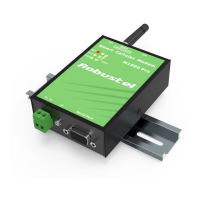
Do you have a question about the Robustel GoRugged M1000 Pro V2 and is the answer not in the manual?
| Product Type | Industrial Cellular Gateway |
|---|---|
| Power Supply | 9-36 VDC |
| SIM Slots | 1 |
| Cellular Connectivity | 4G LTE |
| Serial Ports | 1 x RS232/RS485 |
| Operating Temperature | -40°C to +75°C |
Provides a general overview of the Robustel GoRugged M1000 Pro V2 gateway and its capabilities.
Details the items included in the gateway package and optional accessories.
Lists the technical specifications of the gateway, including cellular, serial, and power interfaces.
Shows the physical dimensions and mounting details of the gateway.
Directs users to the datasheet for product selection and ordering information.
Introduces the installation process and identifies key hardware components of the gateway.
Explains the meaning and function of each LED indicator on the gateway for status monitoring.
Details the pinout configuration for the DB9 female connector for RS232 and RS485 interfaces.
Provides step-by-step instructions for inserting and removing SIM cards into the gateway.
Guides users on how to properly connect the external SMA antenna to the gateway.
Explains how to connect the gateway to external controllers or computers using a serial cable.
Describes methods for mounting the gateway, including wall and DIN-rail installations.
Outlines the importance and procedure for grounding the gateway to mitigate EMI.
Details the power supply requirements, input voltage range, and connection polarity.
Explains the two operating modes: Config Mode and Normal Mode, and their functions.
Introduces the PC-based software tool for configuring and managing the gateway.
Describes how to manage the gateway using the RS-232 serial connection and the configurator.
Explains how to manage the gateway remotely using a TCP/IP network connection.
Introduces the main operational areas within the configurator software interface.
Details how to export and import gateway configuration profiles for mass deployment.
Covers the settings for the serial COM port, including type, baud rate, data bits, parity, and stop bits.
Configures basic settings like SIM card PIN lock and related parameters.
Explains how to configure GPRS/UMTS settings for automatic connection and data transmission.
Configures TCP/UDP connection modes, keepalive settings, and connection control parameters.
Manages SIM card priorities, failover policies, and other dual SIM settings.
Configures Dynamic Domain Name Server settings for remote access.
Allows setting up phone numbers and assigning them to phone groups for various functions.
Configures different policies for waking up the gateway, such as by time, call, or SMS.
Configures automatic reboot schedules based on time or incoming calls/SMS.
Sets up parameters for Modbus RTU to Modbus TCP gateway functionality.
Configures advanced TCP connection settings like custom login and keep-alive mechanisms.
Configures Network Management System (NMS) settings, including device name and TCP server for management.
Displays the current operational status of the gateway, including cellular and TCP/IP information.
Provides system tools such as synchronizing time, outputting debug info, and upgrading firmware.
Introduces cellular data transmission as a mechanism for remote device communication and its benefits.
Discusses common use cases and scenarios for the gateway.
Explains how the gateway functions as a TCP client to initiate connections and transmit data.
Describes the gateway's operation as a TCP server, accepting incoming connections from host computers.
Details the UDP protocol and its suitability for applications requiring fast, connectionless data delivery.
Explains how to use the gateway with software designed for pure serial communication via Virtual COM.
Lists the default COM port settings for the gateway in Config and Normal modes.
Covers remote configuration and status reading using SMS commands.
Defines the structure and syntax of SMS commands for controlling the gateway.
Provides a step-by-step guide on how to use SMS commands for parameter configuration.
A comprehensive list of SMS commands with their descriptions and syntax.
Illustrates practical examples of using SMS commands for various configurations.
Offers solutions for issues where the gateway's LED indicators are not functioning.
Provides troubleshooting steps for serial communication connection failures.
Offers solutions for problems preventing the establishment of GPRS/UMTS connections.
